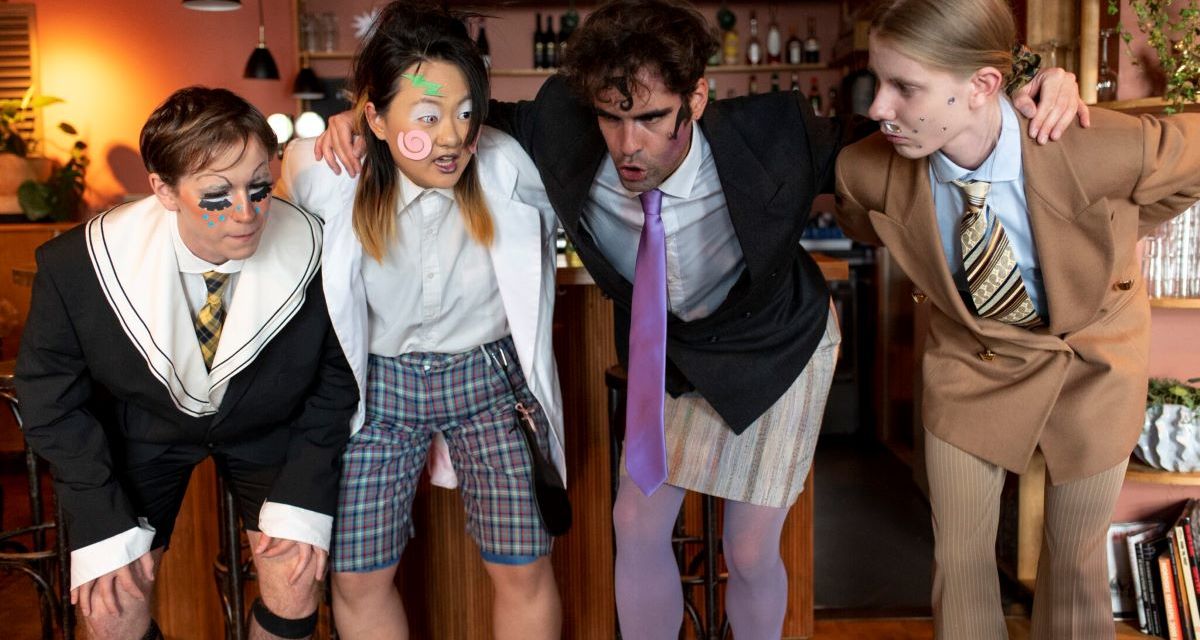The full programme for the 2023 Grimeborn Opera Festival has been revealed. Now in its 16th year, the festival features 12 operas from around the world. This year’s Grimeborn opens on 19 July and runs to 23 September, taking place at Arcola Theatre in Dalston, east London.
The programme comprises two world premieres, a European premiere, two UK premieres, six new interpretations of well-known operas and a revival of a Gilbert and Sullivan favourite.
Grimeborn opens with a new interpretation of Otto Nicolai’s Merry Wives of Windsor (1849), based on the Shakespeare play of the same name. The production is presented by Queer Voices, Norway’s first and only queer opera company by, with and for the LGBTQIA+ community.
This battle between genders and between generations for power, love and respect challenges gender roles in a burlesque, exuberant comic opera. Performances run from 19-22 July.
Arcola Theatre’s artistic director Mehmet Ergen will be staging the European premiere of Marc Blitzstein’s No For An Answer. Written in 1941, the opera is set in the Diogenes Club, a Greek-American social club of waiters, hotel and restaurant workers, chefs, laundresses, chambermaids and taxi drivers in a time of austerity, cost-of-living crisis and rising unemployment.
Variously described as a musical play and an opera, it only received a semi-staged premiere in 1941; it wasn’t until 2001 that it received its first fully staged production. Performances of Ergen’s fully staged version run from 26-29 July.
Barefoot Opera presents a radically reimagined version of Rossini’s La Cenerentola (Cinderella, 1817). Fairytale meets TikTok in this physical theatre retelling. Cinderella’s step-sisters and their dad are status-obsessed social media influencers, while our heroine wins her prince through an act of kindness.
The small onstage orchestra also plays the part of the prince’s court. The clarinettist even doubles as Alidoro, a wise man of the court. Performances run from 1-5 August.
Bernstein’s satirical take on the American dream, Trouble in Tahiti (1952) follows unhappily married couple Sam and Dinah. In director Finn Lacey’s retelling, they escape from their dysfunctional home life through work, the gym and movies, but with their young son Junior in the house, they are forced to address their growing isolation.
In this innovative production, dancers will physically represent the jazz trio who play the role of the Greek chorus. Performances run from 9-12 August.
Jesuit composer Domenico Zipoli wrote Loyola in around 1720. This long-lost baroque opera tells the history of the Saints Ignacio Loyola and Francisco Javier, founders of the Society of Jesus (Jesuits). It receives its UK stage premiere at Grimeborn.
The production is presented by El Parnaso Hyspano, an ensemble specialising in Hispanic early music and led by Argentinian tenor Rafael Montero, who also sings the role of Loyola. Performances take place on 11 and 12 August.
It’s love at first sight when Adam meets Eve at the A&E ward of Homerton Hospital. But when Adam is tempted to download dating app Tinder, everything changes. Grimeborn hosts the world premiere of A&E, the debut opera from creative duo Muelas+Ward.
Performances run from 15-19 August.
An innovative double-bill examines love longed for and love lost. Massenet’s The Portrait of Manon (1894) and Ravel’s L’heure espagnole (Spanish Time, 1911) feature new English libretti by Lindsay Bramley.
In the first, Manon has died in the desert, bemoaning the rich life she might have had were it not for love, leaving behind her lover De Grieux, heartbroken and bereft. L’heure espagnole sees its central character in a stable secure marriage – into which she is determined to inject a little excitement.
The production runs from 22-26 August
A radical and relevant reinterpretation of Puccini’s Turandot (1926) repositions this historically problematic opera to reflect a British East and South-East Asian narrative. In an examination of the harmful tragedy of online obsession, Calaf is struggling with emotional connection and disenfranchisement, and finds himself drawn into the digital hellscape of Turandot.
South-East Asian director-writer Iskandar Sharazuddin’s production runs from 23-26 August.
The UK premiere of Céphale et Procris (1694) by French female composer Élisabeth-Claude Jacquet de La Guerre demonstrates how French Baroque opera can be relevant today. Marcio da Silva’s production explores the timeless tensions of gender inequality.
The opera tells the story of the love between Céphale, a warrior, and Procris, the daughter of the King of Athens. It runs from 29 August-2 September.
Green Opera returns to Grimeborn after a successful run of Bartók’s Bluebeard’s Castle (1918) last year. The world’s first environmentally sustainable opera company is staging a new production of Jane Eyre (2016), John Joubert’s adaptation of Charlotte Brontë’s classic novel.
Eleanor Burke’s production explores the enduring struggle for freedom in a world that refuses to accept the individual. Performances run from 6-9 September.
This is fittingly followed by the world premiere of Brontë, the Opera, a compelling literary detective story about the turbulent lives of the Brontë sisters. Based on an acclaimed play by Polly Teale, it has been adapted as an opera by composer Lisa Logan. It runs from 2-16 September.
Closing the festival is a revival of Charles Court Opera’s version of Gilbert and Sullivan favourite The Mikado. Directed by G&S specialist John Savournin, this is a witty and sophisticated take on a lively, satirical farce. It runs from 19-23 September.
Tickets for all productions are on sale now, and further information on prices, dates, times and cast for all events is available from Arcola Theatre.
Image
Opening this year’s Grimeborn Festival, Queer Voices’ experimental staging of Otto Nicolai’s Merry Wives of Windsor challenges traditional gender roles.

